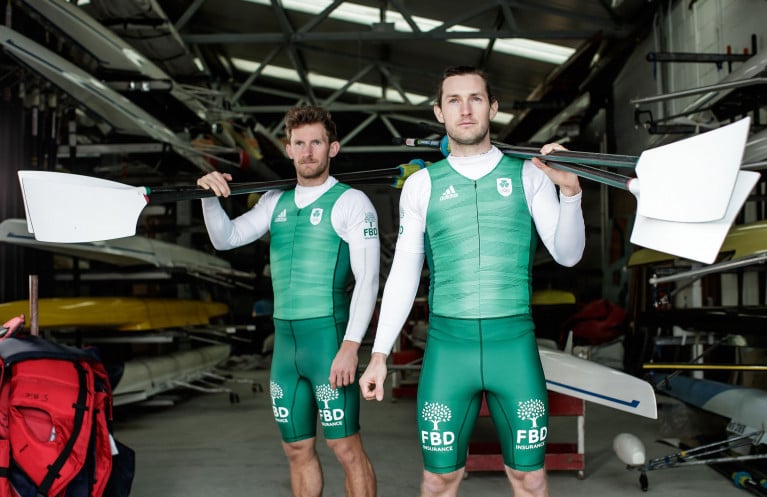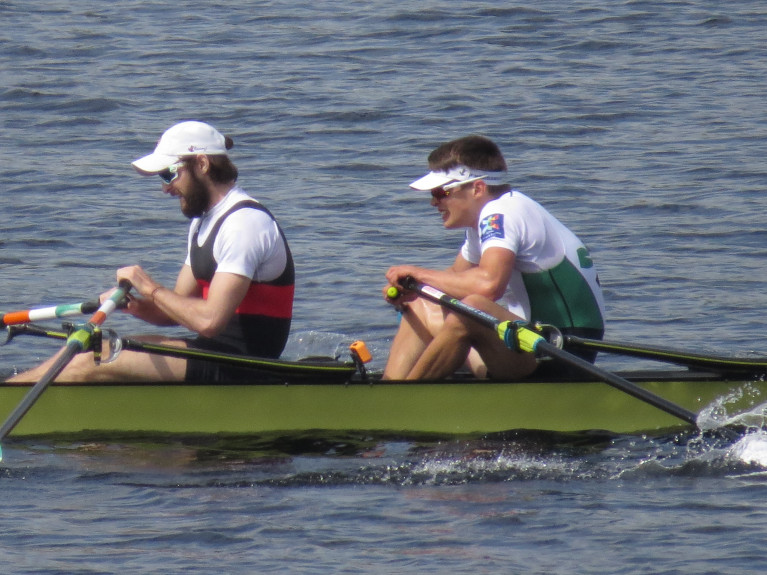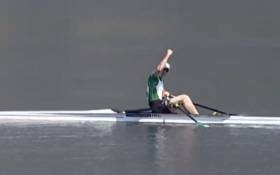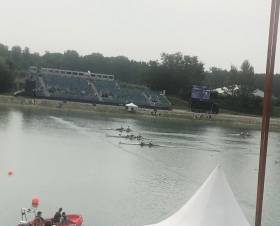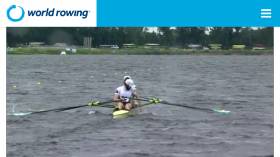Displaying items by tag: Paul O'Donovan
Paul O'Donovan has upheld his streak of success, winning gold in his return to the international rowing scene, as well as setting a new World Cup Record. Paul was the only Irish athlete competing this weekend at World Cup III in Lucerne, Switzerland and was accompanied by Dominic Casey, the High-Performance Lightweight coach.
The Skibbereen rower, currently studying and racing for University College Cork, stormed his heat, winning it by 7 seconds. With this performance, he was going straight into the A/B Semi this morning with the fastest time. Lukasz Sawicki from Poland and Finn Wolter from Germany were both unable to race the Semi due to illness, which reduced the field to four boats.
As usual, Paul started steady, and slowly but surely came through each of the crews as they progressed through the 2k. In a tight race, only three crews could qualify for the A Final, and the Algerian sculler was just .75 of a second short of that qualifying position.
Paul finished off the event with his fastest race, coming across the finish line with a time of 6:47.15, a new World Cup record.
Rowing Ireland’s High-Performance Director, Antonio Maurogiovanni, said: "We are delighted with Paul’s performance, and to see him coming away from World Cup III with the gold medal. After good racing here, and in Poznan, we look forward to Europeans and the World Championships in the coming months".
O'Donovans Looking Forward With Confidence
Paul O’Donovan and Gary O’Donovan, Ireland’s silver medallists from the Rio Olympic Games are taking their enforced break from competition in their stride. In an extensive interview, facilitated by Team Ireland sponsors FBD, Paul talks about finding time again for medical studies and exams, while Gary sees a bright future for Irish rowing – and revels in the joy of chasing cattle in the fields of West Cork.
Just weeks ago they came back from a training camp in Seville to find everything had changed.
“We were in the south of Spain when things were kicking off in the north of Spain,” Gary says. “We came home then fairly lively. We were advised to quarantine for two weeks after that, so we headed home to West Cork and kind of locked ourselves into a little house there and stayed away from everyone for a fortnight. The fortnight has pretty much turned into a month.
“What we really notice is how sheltered our lives [usually] are. We are not out in public that much at all. Y’know, you’d be hearing how challenging it is for all these people. I guess they’re lives are changing drastically if they’re not going into work in an office every day. Things are having to change a lot for them.
“For us, we don’t really go very far. Up to the rowing club and back home and go to the grocery store maybe once a week, twice at most.”
Paul chips in.
“[Now] we don’t go to the rowing club, we do our training here.”
The shift to a new lifestyle came in stages. First they were isolating, then the Olympic Games were postponed. When that decision eventually came, it was, says Gary, a relief. They did not have to try to do high-pressure work while obeying Government rules on movement.
“Right, the priority now is not training; it’s not the Olympics; it’s not our own ambitions and goals. The priority is now to follow the health and safety guidelines and do what’s best for the people, the same way everyone else in the public is doing it.”
“I think we’re lucky,” Paul chips in. “Although our priority is different we can still do more or less the same thing but we’re just doing it in the house because we’ve got rowing machines and a bit of weight lifting equipment. So, it doesn’t impact our training too much.”
In this year’s trials, Paul had already established himself as an immovable part of the lightweight double. Gary remained focused on winning his place in the boat. Now that the final trial is pushed forward a year or so Gary says the motivation is to retain the edge.
“With the Games so far away now, we’ve taken our foot off the gas quite a bit. We’re still doing a good bit of training. We’re very fit, very fast. To me the motivating factor is to not lose that fitness. I think it would be an awful shame to let all that training go to waste by putting a stop to the training for even a few weeks. You’d start to go backwards.
“So [we] keep chipping away at it; you do as much as you can.”
Paul’s medical studies had been put on hold. Now he can take them up again.
“I had taken break at Christmas, after my exams, but since they cancelled the Tokyo thing this (season), I got onto the Quercus scholarship (people) in UCC. They liaised with the school and they allowed me to do all the material online. I’ll sit the exams for this semester in the August sitting. They’ve been really accommodating.”
Most likely, their first international action will be in 2021. However, this week, the world governing body of rowing, Fisa, announced that they had provisionally rescheduled the European Championships, sited in Poland, for the first weekend in September.
Gary says they have no way of knowing whether they will happen, but if they do, he would love to compete.
“I’d love to race, yeh. It would be nice to go abroad if the pandemic is coming to an end. If we’re over the worst of it and we can, it would be great to go and race and have something to look forward to.”
However, the rate of recovery of different countries could make it problematic. If some crews could not get together, it could be “a bit of a mess of a regatta”. However “that could bring it back to the fundamentals of sport, really, where you just do it for sport, do it for fun”.
Apart from training, have they found other things to do?
Gary does not believe in over-thinking it. “Just wandering around the house a bit, read a book, listen to some podcasts, revise my rowing knowledge (by) doing some reading on rowing. I don’t do a whole pile – loiter about to try and pass the time.”
Being based in West Cork is an advantage.
There are amenities very close by and he can go to the strand, “or walk around the bushes, head into some lad’s animals in the field and chase them around. You could do anything, like! I love living out in the countryside.”
When they are asked for tips for others at this time, they are slow to make recommendations. Paul says people should think of themselves as staying home to save others – “my goal is to stop the spread of this virus”.
“There’s nothing else you can do at the minute (just) stop feeling sorry for yourself. That’s easy for me to say, ’cos I don’t like talking to people anyway! Gary might have better advice for the more extroverted people.”
Gary doubts that adopting a routine is practical. “Tis often very easy to lie in bed in the morning and take your leisure. They’re isn’t much wrong with that either. I’m happy enough here: get up in my own time, do my own training, and yerra, try to be a little bit productive.
“’Tis often the way that doing something small is better than doing nothing at all.”
They have thought-out – and optimistic – views on how Irish rowing has changed in the four years since their Olympic medal in 2016.
Gary talks of how it has been a process of more knowledge providing a base for those with ambition.
When they were young, they were trying to figure things out.
“In a way we didn’t really know what we were doing. We were doing the best we could. We were making the best decisions we knew how at the time. A lot of it was trial and error.
“We used to say to ourselves, and say publically, look what knowledge we have now. Jaysus, imagine what it will be like in another two years, or another four years after a lot more competition, a lot more training and a lot more racing. I think we’ve come a long way since then. We’ve got a much bigger understanding of the sport, of the training and what we do.”
Paul adds: “I think more people, when they see what we’ve done, I suppose they have a bit more belief in themselves, that if they start to commit, if they follow a programme, they see they’ll achieve as well. It becomes a bit more tangible for them. [Because] more people are able to do that, you see the team expanding.
“We’ve made mistakes along the way. And we can help younger people, fast-track them along a bit.”
Ireland had sporadic success in the 1990s and early 2000s. Niall O’Toole won a World Championships gold in 1991 and the lightweight four were fourth at the Olympic Games in 1996. There were three wins at the World Championships in 2001 and Ireland continued to have some moments in the spotlight all the way to the Olympic cycle which culminated in Beijing 2008.
Then it stopped.
“After 2008, nearly everyone quit,” Paul says. “There was a mass exodus at the top level.
“It took a long time for the people who were left to gather the knowledge of how much training needs to be done; what format of it, this kind of thing.
“Now that we’ve figured out the bones of that, it is easier to fast-track people and get them to buy into it, so that they can commit to it.
“The bit of continuity has made a big difference to the sport.”
“In Rio, myself and Paul were the only medalling crew,” Gary says. “And then Ireland started getting more medals, through the (men’s) lightweight pair and through Sanita [Puspure] and the lightweight women’s single.
“And what happens then is they start accumulating the knowledge and understanding and knowing what’s required and passing it on to more people. And then you’ve got more people involved.
“Now, you’ve got the men’s heavyweight double, the women’s pair and the women’s heavyweight four. And more clubs are getting involved.”
The knowledge is passed on.
“You’re exposing them to the sport of rowing – but you’re exposing them to success. [Success] is within arms’ reach.”
He takes the example of the women’s pair qualifying for the Olympics. They are a link to world champions, Puspure and the men’s lightweight double, but also back to clubs, where ambitious athletes can now see the way to excel. It is as if the successful crews are stepping stones, a ladder into the team and all the way to podiums at big events.
And if young rowers want to progress, “we’re willing to share knowledge”.
“We’re not sitting here saying ‘we won’t tell anyone what we’re doing because they might beat me’.”
They share information and hopefully others get better and Irish rowing and coaching in general benefits.
Gary O’Donovan believes that if anyone had said in 2014 that Ireland would win two gold medals and a silver at the 2019 World Championships and would qualify four boats for Tokyo it would have been seen as “unbelievable”.
“In the past, people would throw a year or two at it and say ‘I can’t make it, I haven’t made it, it’s impossible’. Now you can tell people: ‘this could take four years, it could take five, but if you keep chipping away and keep getting better success will come – if you do all the right things.
“In four years we’ve got all that done. What will it look like in another four years, when we have got even more knowledge?”
He believes Irish coaches have become braver. He uses the example of Dominic Casey, a club coach in Skibbereen who went all the way to guiding the O’Donovans to a medal at the Olympics.
“Club coaches can say ‘if Dominic Casey can do it, I can do it’ and their athletes are doing it.”
“Given another four years, what knowledge will Irish rowing have. In another 10 years, what knowledge will it have?
“Hopefully we can retain that and keep success going along into the future.”
Paul and Gary O'Donovan are FBD Brand Ambassadors. FBD Insurance is a principal partner to Team Ireland since September 2018. As part of its sponsorship, FBD is supporting Team Ireland’s Olympic hopefuls to enable them to focus on personal bests and breakthrough performances at the Summer Olympic Games in Tokyo which will now take place in 2021. It is this same spirit of support and protection that sees FBD as Ireland’s only homegrown insurer support more than 500,000 policyholders for over 50 years.
Paul O'Donovan, Fintan McCarthy and Sanita Puspure named Afloat Rowers of the Year
Ireland’s two world champion crews of 2019 are the Afloat Rowers of the Year. Sanita Puspure defended her title in the women’s single sculls, while Paul O’Donovan and Fintan McCarthy proved themselves the best lightweight double in the world.
Paul O’Donovan’s fortitude, ambition, self-belief and professionalism make him the best male rower to come out of Ireland and one of the greatest sportsmen. Teamed up with his brother, Gary O’Donovan, he led the country to its first Olympic rowing medal in 2016, and the two went on to win World Championship gold in the lightweight double in 2018.
The year 2019 was different. Gary broke a bone in his wrist early in the year and took months to recover. The competition for the doubles spot with Paul O’Donovan was hot: the picture above shows the winning triallists, Fintan McCarthy and Paul O’Donovan just after they crossed the line and secured the coveted gig. They competed in the final World Cup in Rotterdam: in an amazing race with Germany they were beaten for the gold by three hundredths of a second despite having stopped while Paul flipped Fintan’s errant stroke coach back into the boat.
The World Championship final was – astoundingly – even more dramatic. Paul O’Donovan scoffs at those who say his crews start slowly. The statistics generally back him up. But in Linz-Ottensheim, Paul and Fintan were two and a half seconds down on the field (just over a length) at 500 metres. Italy and Germany looked strong and in command ahead of them. Could the men in green come back and still be there at the end? Even knowing the outcome, the video is a thriller. Through the second quarter, the Ireland unit outpaces every other crew; by 1300 metres they have shot into the lead; they build on that advantage to win by the margin by which they were behind 1500 metres before. As Paul and Fintan chatted to media after the race, Italy’s Pietro Ruta – he of the flowing beard – lay sprawled and virtually motionless in the media area. Silver was his, but his crew had yielded to the all-conquering Irish.
The World Championships saw the Ireland women’s pair of Monika Dukarska and Aileen Crowley qualify the boat for the Olympics, the men’s double of Phil Doyle and Ronan Byrne sweep to silver, while Katie O’Brien took the bronze medal in the PR2 pararowing final.
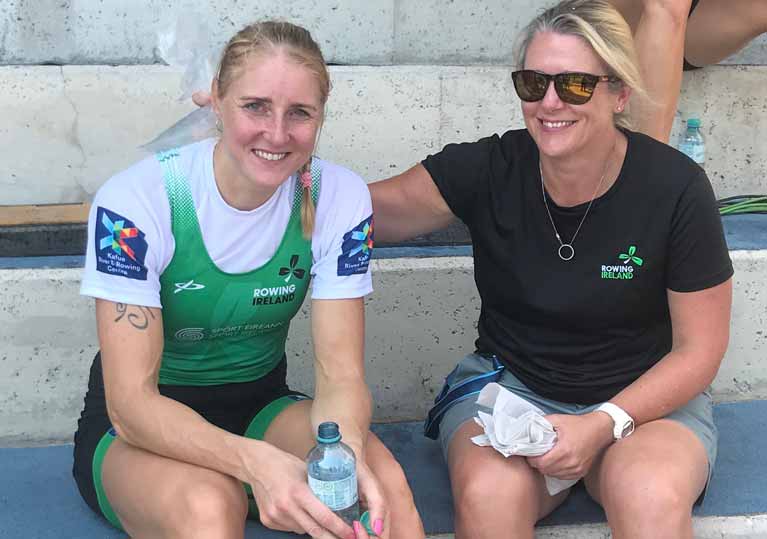 Sanita (left) with Sarah Jane McDonnell
Sanita (left) with Sarah Jane McDonnell
Sanita Puspure topped it all. A year in which her competition was curtailed as she spent time with her dying sister Inese became a year in which she showed what a wonderful, inspiring, athlete she can be. The women’s single sculls at the World Championships might well have been all about the comeback story of New Zealand’s Emma Twigg. Self-exiled in order to study, she had paid the price of falling away from competition. Fourth at the Olympic Games in 2016, she roared back in 2019 to win the World Cup regattas in Poznan, Poland and Rotterdam. In the World Championships semi-final, Twigg hung on to Puspure and took second; in the final she blasted out into the lead and held it till the final quarter, only to see Puspure flash past to win well. For Puspure it had been four races, four wins, four demonstrations of her command.
Sanita Puspure, Paul O’Donovan and Fintan McCarthy are the Afloat Rowers of the Year 2019.
Rower of the Year awards: The judging panel is made up of Liam Gorman, rowing correspondent of The Irish Times and David O'Brien, Editor of Afloat magazine. Monthly awards for achievements during the year 2020 will appear on afloat.ie. Keep a monthly eye on progress and watch our champions list grow.
Three Ireland Finalists for World Rowing Awards 2019
#Rowing: Ireland figure strongly in the finalists for the World Rowing Awards 2019. World champions Sanita Puspure, in the single sculls, and the lightweight double of Paul O’Donovan and Fintan McCarthy are finalists for women’s and men’s crews of the year. Ronan Byrne (21) is one of four finalists for the Filippi Spirit Award for outstanding university rower. Byrne won gold in the single sculls at the European Under-23 Championships just a week after partnering Philip Doyle to silver in the double sculls at the senior World Championships.
The award ceremony is on November 22nd in London.
Finalists for the 2019 World Rowing Awards
Thomas Keller Medal – for a rower who has had a long and successful rowing career and who has made an outstanding contribution to rowing as a competitor and as a sports personality.
- · Kim Brennan,Australia
- · Ekaterina Karsten,Belarus
- · James Cracknell,Great Britain
- · Pete Reed,Great Britain
- · Andrew Triggs Hodge,Great Britain
Filippi Spirit Award – for a university rower who has demonstrated the core values of rowing in his/her social, academic and sporting life and, through these values, also enabled or inspired exceptional success in other people's lives.
- · Ria Thompson,Australia
- · Jean Maillard,France
- · Ronan Byrne,Ireland
- · Nicholas Perovich,United States
World Rowing Sustainability Award – for an organisation that has implemented an innovative project or initiative delivering a clear and positive sustainability impact.
- · Spring Creek Regeneration Project,Australia
- · 2018 World Rowing Coastal Championships,Canada
- · Wintech: Clean air, water and solar power,China
- · Rowers Against Rubbish,Great Britain
- · Developing Environmental Ambassadors,Japan
World Rowing Para-rowing Crew of the Year
- · Kathryn Ross,Australia,Para PR2 Women’s Single Sculls
- · Ellen Buttrick, Giedre Rakauskaite, James Fox, Oliver Stanhope and Erin Wysocki-Jones (coxswain),Great Britain,Para PR3 Mixed Coxed Four
- · Lauren Rowles and Laurence Whiteley,Great Britain,Para PR2 Mixed Double Sculls
- · Birgit Skarstein,Norway,Para PR1 Women’s Single Sculls
- · Roman Polianskyi,Ukraine,Para PR1 Men’s Single Sculls
World Rowing Men’s Crew of the Year
- · Zhiyu Liu and Liang Zhang,China,Men’s Double Sculls
- · Valent Sinkovic and Martin Sinkovic,Croatia,Men’s Pair
- · Oliver Zeidler,Germany,Men’s Single Sculls
- · Paul O’Donovan and Fintan McCarthy,Ireland,Lightweight Men’s Double Sculls
- · Dirk Uittenbogaard, Abe Wiersma, Tone Wieten and Koen Metsmakers,The Netherlands,Men’s Quadruple Sculls
World Rowing Women’s Crew of the Year
- · Olympia Aldersey, Katrina Werry, Sarah Hawe and Lucy Stephan,Australia,Women’s Four
- · Yunxia Chen, Ling Zhang, Yang Lyu, Xiaotong Cui,China,Women’s Quadruple Sculls
- · Sanita Puspure,Ireland,Women’s Single Sculls
- · Zoe McBride and Jackie Kiddle,New Zealand,Lightweight Women’s Double Sculls
- · Grace Prendergast and Kerri Gowler,New Zealand,Women’s Pair
World Rowing Coach of the Year
- · Bernd Nennhaus,Germany,junior rowing crews
- · Tom Dyson,Great Britain,Para-rowing coach
- · Eelco Meenhorst,Netherlands,men’s sculling head coach
- · Gary Hay,New Zealand,women’s head coach
- · Johan Flodin,Norway,head coach
World Champions O'Donovan, McCarthy and Puspure are Rowers of the Month
#Rowing: The two crews which won gold for Ireland at the World Championships, the lightweight men’s double of Paul O’Donovan and Fintan McCarthy and single sculler Sanita Puspure, are the Afloat Rowers of the Month for August.
The month was quite extraordinary. The Ireland double of Philip Doyle and Ronan Byrne qualified their boat for Tokyo at the World Championships in Linz-Ottensheim and then went on to take silver with an assured, technically impressive, performance in a gripping final; the women’s pair of Aileen Crowley and Monika Dukarska secured qualification with second in their B Final, eighth overall, well within the 11 places allotted for Tokyo. Along with the two gold-medal boats, this brought the Ireland complement for the Olympic Games to four, a record in the era of boats having to qualify through set competition.
The Championships had also been a joyful one for Katie O’Brien. She took Ireland’s first medal, a bronze, in the PR2 single sculls on her 23rd birthday.
Ireland crews came up just short of podium finishes at the Coupe de la Jeunesse and the World Junior Championships. Back in Ireland, the two Coastal Rowing Championships generated fine entries and plenty of excitement.
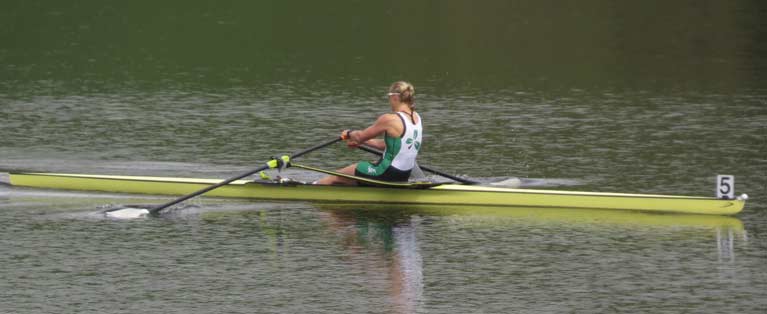 World champion Sanita Puspure in action Photo: Liam Gorman
World champion Sanita Puspure in action Photo: Liam Gorman
The pressure was on Sanita Puspure and the lightweight double in Austria. Puspure’s year was affected by family bereavement. She was defending a title in a keenly-contested category. Looking back, her achievement can seem pre-ordained – it was not. She won her early races by big margins, consigning former Olympic champion Mirka Topinkova Knapkova to a distant second in her quarter-final. And then came the semi-final. Emma Twigg of New Zealand had made no secret of her ambition of ousting her friend from her eminent position. Puspure never let her get the chance, outpacing her in each of the four quarters. The final, on September 1st, would see Twigg try to win from the front. It was desperate stuff, and Puspure, knowing she had the resources to do it, waited her out and rowed through her.
Nominally, the Ireland lightweight double were defending their title. But this was a new combination, with Fintan McCarthy coming in to partner Paul O’Donovan. The finish of their semi-final was nail-biting, as three boats (Ireland, Germany, Norway) were covered by .69 of a second. In the final the feeling of jeopardy lasted the whole race. Ireland had a poor first quarter, which left them trailing the field, produced a ridiculously good middle thousand in which they passed Germany and Italy, and then gritted it out to take a clearwater win. The exhaustion – physical, mental – of the second-placed Italy crew of Pietro Ruta and Stefano Oppo after the race was affecting. They looked like they could not process what had happened to them.
Rower of the Month awards: The judging panel is made up of Liam Gorman, rowing correspondent of The Irish Times and David O'Brien, Editor of Afloat magazine. Monthly awards for achievements during the year will appear on afloat.ie. Keep a monthly eye on progress and watch our 2019 champions list grow.
McCarthy and O'Donovan Speed Past Opponents to Win Gold
#Rowing: Paul O'Donovan and Fintan McCarthy became the world champions in the lightweight double sculls with an outstanding victory over Germany and Italy here in Linz-Ottensheim.
The men in blue and red and white disputed the lead through the first quarter of the race, with Ireland a length behind in sixth. From there O'Donovan and McCarthy put the foot down. They set the fastest time for the next three quarters, accelerating into the headwind and clawing their way to level and then past their two big rivals.
They kept going right to the end and beat the Italians by just over a length, with Germany taking the bronze.
World Rowing Championshiops, Linz-Ottensheim, Day Seven (Irish interest)
Men
Lightweight Double - A Final: 1 Ireland (F McCarthy, P O'Donovan) 6:37.28, 2 Italy 6:39.71, 3 Germany 6:41.07.
Women
Four - B Final (First Two book Olympic places for boat): 1 Britain 6:55.08, 2 Canada 6:56.99; 3 China 7:02.28, 4 Ireland Ireland (T Hanlon, E Lambe, A Keogh, E Hegarty) 7:02.71.
Pair - B Final (First Five book Olympic places for boat): 1 Romania 7:18.88, 2 Ireland (A Crowley, M Dukarska) 7:20.68.
Lightweight Double Sculls - C Final (Places 13 to 18) 1 China 7:00.82; 5 Ireland (A Casey, D Walsh) 7:10.52.
Thrilling Semi-Final Win By O'Donovan and McCarthy Sends Ireland Boat to Olympic Games
#Rowing: Ireland's first boat qualified for the 2020 Olympic Games is the lightweight men's double. Fintan McCarthy and Paul O'Donovan won in a thrilling semi-final here in Linz-Ottensmeim to take an A Final place at the World Championships and land a berth for the boat in Tokyo.
This was classic Paul O'Donovan. He gelled with his new partner, McCarthy, to produce a perfectly-judged finish which pushed Germany into second - by 13 hundredths of a second. Norway, like Ireland, had watched Germany and Australia do the early work, then closed on them in the final stages. The Norway crew of Are Strandli and Kris Brun, who were bronze medallists behind Ireland's silver in Rio 2016, produced the fastest finish of all to take third. Australia fell back to fifth.
All six A Finalists and the eventual winner of the B Final qualify boats for Tokyo 2020.
The Ireland women's pair of Aileen Crowley and Monika Dukarska will have to make their way through the B Final (placing fifth or better) if they are to qualify the boat for the Olympics. They finished fourth in a hotly-contested semi-final. New Zealand won with a commanding performance; the United States forced their way into second; the battle was joined between Ireland and fast-finishing Italy, who took the crucial third place.
World Rowing Championships, Linz-Ottensheim, Austria - Day Five (Irish interest)
Men
Lightweight Double Sculls - A/B Semi-Final Two (First Three to A Final; rest to B Final): 1 Ireland (F McCarthy, P O'Donovan) 6:13.46, 2 Germany 6:13.59, 3 Norway 6:14.15.
Women
Pair - A/B Semi-Final Two (First Three to A Final; rest to B Final): 1 New Zealand 6:57.92, 2 United States 7:01.78, 3 Italy 7:01.80; 4 Ireland (A Crowley, M Dukarska) 7:03.05.
O'Donovan and McCarthy Win Way to World Semi-Finals
#Rowing: It was tight at the finish, but Paul O'Donovan and Fintan McCarthy qualified for the semi-finals of the lightweight double sculls at the World Championships with a win here in Linz-Ottensheim. Spain held the lead through much of this quarter-final, but Ireland were poised to take them and did in the final quarter. Poland took third.
The women's lightweight double dropped out of the running for a top-three place early on, but kept fighting to the line. They beat Poland in a battle for fourth. They will compete in the C/D Semi-Finals.
World Rowing Championships, Linz-Ottensheim, Austria, Day Four (Irish interest)
Men
Lightweight Double Sculls - Quarter-Final Three - (First Three to A/B Semi-Finals; rest to C/D Semi-Finals): 1 Ireland (F McCarthy, P O'Donovan) 6:20.84, 2 Spain 6:22.84, 3 Poland 6:23.72.
Women
Pair - Quarter-Final Two (First Three to A/B Semi-Finals; rest to C/D Semi-Finals): 1 Australia 7:08.74, 2 Ireland (A Crowley, M Dukarska) 7:12.51, 3 Italy 7:13.11.
Lightweight Double Sculls - Quarter-Final Three - (First Three to A/B Semi-Finals; rest to C/D Semi-Finals): 4 Ireland (A Casey, D Walsh) 7:07.17.
Pararowing: Women's PR Two Single Sculls, Preliminary Race: 1 Australia (K Ross) 9:24.99; 3 Ireland (K O'Brien) 9:52.13.
#Rowing: Ireland’s Fintan McCarthy and Paul O’Donovan won their heat to qualify directly for their quarter-final of the lightweight double sculls at the World Rowing Championships in Austria this morning. The Skibbereen-UCC combination were well in command all through. There was a big surprise in the previous heat. Norway, who took bronze at the Rio Olympics, did not make it directly to the quarter-finals. They were fourth.
World Rowing Championships, Linz, Austria, Day One (Irish interest)
Men
Pair – Heat One (First Four to Quarter-Finals; rest to Repechage): 6 Ireland (M O’Donovan, S O’Driscoll) 6:50.51.
Lightweight Double Sculls – Heat Three (First Three to Quarter-Finals; rest to Repechage): 1 Ireland (F McCarthy, P O’Donovan) 6:28.02
Women
Pair – Heat Four (First Four to Quarter-Finals; rest to Repechage): 2 Ireland (A Crowley, M Dukarska) 7:13.30
#Rowing: Paul O'Donovan and Fintan McCarthy took a second silver medal for Ireland after an extraordinary final of the lightweight double sculls at the World Cup in Rotterdam today.
Ireland took over the lead early and led all the way until they were caught right on the line by Germany - the photo finish showed just .03 of a second between the crews.
The race had a memorable moment in the second quarter. Paul O'Donovan showed great calmness to reach down and grab what looked like the stroke coach of the bowman which had gone over the side to shuck it back in the boat. The incident may have cost the crew time, but they retained their lead from there to the line.
Ronan Byrne and Philip Doyle had earlier sculled really well to take silver in the men's openweight double sculls.
World Cup Regatta, Rotterdam, Day Three (Irish interest)
Men
Double Sculls - A Final: 1 Switzerland 6:41.04, 2 Ireland (P Doyle, R Byrne) 6:41.74, 3 Britain 6:44.95.
Lightweight Double Sculls - A Final: 1 Germany 7:01.59, 2 Ireland (F McCarthy, P O'Donovan) 7:01.62, 3 Norway 7:02.26.
Women
Pair - A Final: 1 Australia 7:26.15, 2 New Zealand 7:27.57, 3 Britain 7:40.51; Ireland (A Crowley, M Dukarska) 7:50.08.
Lightweight Double Sculls - B Final (places 7 to 12): 6 Ireland (L Heaphy, D Walsh) 7:45.98.


























